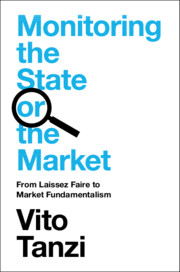
-
Select format
-
- Publisher:
- Cambridge University Press
- Publication date:
- December 2023
- December 2023
- ISBN:
- 9781009434430
- 9781009434447
- 9781009434478
- Dimensions:
- (229 x 152 mm)
- Weight & Pages:
- 0.465kg, 232 Pages
- Dimensions:
- (229 x 152 mm)
- Weight & Pages:
- 0.39kg, 232 Pages
- Subjects:
- Economics, Economic Theory, Economic Development and Growth
You may already have access via personal or institutional login- Subjects:
- Economics, Economic Theory, Economic Development and Growth
Book description
Many economists argue that economic analysis should avoid the distributional consequences of policies. In democratic countries, however, the political power of individuals inevitably reflects their wealth and income. You cannot have a democracy when income and wealth distributions are greatly uneven. Monitoring the State or the Market explains that absolute income equality is not consistent with a market economy, yet neither is large inequality. This study provides a broad survey of major social and economic developments over the past two centuries, beginning with the Industrial Revolution and laissez faire and ending with neoliberalism and market fundamentalism. It explains how each of these periods initially brought moderation and accompanying benefits, showing that some countries, such as those in Scandinavia, have demonstrated that it is possible to have low Gini coefficients (low inequality), while preserving economic freedom and prosperity.
Reviews
‘The book encapsulates Tanzi's reflections and musings on both economic history and the history of economic thought from the three periods studied. His aim of evaluating who was more sensible, those pushing for minimal state involvement or those arguing for a larger role for the government, is admirable and timely. Recommended.’
K. J. Murphy Source: CHOICE
Contents
Metrics
Altmetric attention score
Full text views
Full text views help Loading metrics...
Loading metrics...
* Views captured on Cambridge Core between #date#. This data will be updated every 24 hours.
Usage data cannot currently be displayed.
Accessibility standard: Unknown
Why this information is here
This section outlines the accessibility features of this content - including support for screen readers, full keyboard navigation and high-contrast display options. This may not be relevant for you.
Accessibility Information
Accessibility compliance for the PDF of this book is currently unknown and may be updated in the future.


